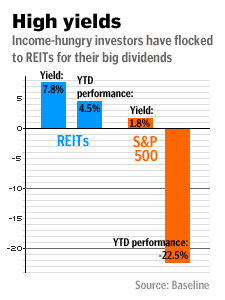NEW YORK (CNN/Money) -
A shaky economy, corporate scandals and global political turmoil. Add all that up and 2002 was another woeful year for the stock market.
Gold and real estate investment trusts (REITs) are among the precious few stock sectors on track to finish 2002 in the black. And for the third year in a row, bonds will outperform stocks.
With investors still waiting for an economic recovery and a pickup in earnings growth (and worrying about war and terrorism), can these asset classes continue to shine in 2003?
After the gold rush
It's going to be hard to top this year's returns for gold stocks. According to financial information database Baseline, the average gain for a group of 29 gold stocks was 147.2 percent. Despite this huge run, the sector still has fans who think the run isn't over.
"Gold has had big moves but overall the outlook still looks favorable," says Todd Campbell, vice president of Alpha Equity Research, an independent research firm. "It's an under-owned investment class and there is a lot of political instability that would fuel gold."
| �* As of Dec. 26 | | �Source:��Morningstar |
|
Investors flock to gold as a safe haven in uncertain times, and as long as Iraq -- not to mention North Korea -- remains entrenched in the daily headlines, shares of the companies that mine gold should do well, the fans say.
To that end, gold prices are hovering around $350 an ounce, a level not seen in five years. Subodh Kumar, chief investment strategist for CIBC World Markets, thinks that gold can continue to outperform the broader market at least through the first quarter of 2003, since the Iraq situation probably won't be resolved by then.
Investors should bear in mind, however, that gold has been a poor investment over the past couple of decades, and its price movements are tough to time. Also, the increase in gold prices are tied not to a surge in demand, but speculation due to the political landscape. In other words, dabble if you must, but don't make huge bets on the precious metal.
The REIT stuff
Real estate investment trusts didn't soar nearly as high as gold stocks in 2002. The average gain for 292 REITs tracked on Baseline as of Dec. 26 was 4.5 percent. But add in an average dividend yield of 7.8 percent and you're looking at a nice double-digit total return. Not too shabby for any market, let alone a bear market in its third year.
| Special: Investing in 2003
|

|
|
|
|
However, there is a good chance that REITs could lose some of their luster in 2003. For one, President Bush has expressed interest in eliminating the so-called "double taxation" on dividends. Many investors like REIT stocks because of their fat yields (REITs are required to pay nearly all of their net income back to shareholders) -- so competition from more dividend-paying companies would hurt.

Investors also need to consider the fundamentals. There are many different types of REITs and those that own apartments and offices could struggle if the economy doesn't pick up soon. That's because rents, which have been steadily declining in many areas, may continue to do so. And if the unemployment rate keeps rising, that could mean more vacancies for office REITs. So despite their big dividends, REITs are still risky.
There's also the fact that the stocks have already enjoyed healthy gains throughout the bear market. According to mutual fund tracker Morningstar, real estate funds, which invest heavily in REITs, have had an average return of 14 percent over the past three years, ranking second only to precious metal funds.
Jeffrey Saut, chief investment strategist for Raymond James, says that he's been pulling back on REITs this year because the stocks are no longer cheap. He's expecting the stocks themselves to post relatively flat performance next year. "I'm not a big advocate of REITs here. The dividends are about all you can expect to earn out of them."
A bond bubble?
Until this year, bonds never beat stocks three years in a row. Is a four-peat possible or will bonds fizzle like the three time defending NBA champion L.A. Lakers? Campbell thinks that after three strong years for bonds, they might be heading for a bubble bursting similar to what happened to stocks in 2000.

With the exception of high-yield bonds, all types of bond funds are up for the year with international bond funds and long-term government bonds enjoying double-digit gains.
But the yield on the 10-year Treasury is at about 3.9 percent and odds are that it won't head much lower, Campbell says.
Despite this, there were still heavy inflows to bond funds last month. According to the Investment Company Institute, $7.7 billion flowed into bond funds in November. For the first eleven months of the year, bond funds took in $133 billion. By way of comparison, investors have taken $19.9 billion out of stock funds through November.
Campbell says that with rates so low and so much money already having gone into bonds, it's going to be tough for bonds to continue to do well next year, especially if the economy starts to show signs of a sustainable recovery.
Saut isn't going as far as predicting a washout for bonds but he also thinks that the chances of bonds having a great year in 2003 are slim. He thinks there will be few economic catalysts (i.e. a series of bad economic news) to fuel strong bond performance. That said, you shouldn't tamper too much with asset allocations in your portfolio -- for your fixed income exposure, see Money Magazine's recommendations.

|

